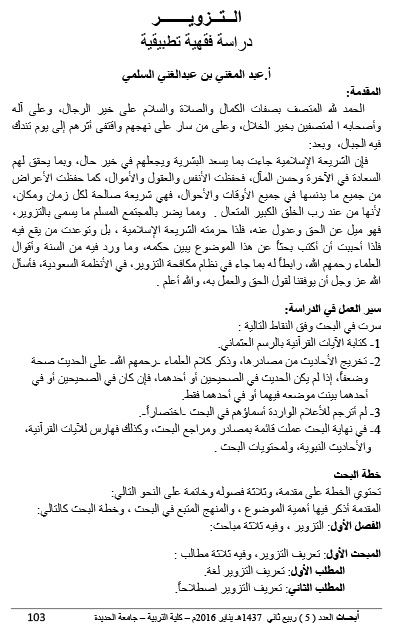counterfeiting Applied jurisprudence study
Keywords:
forgery, jurisprudence, editorsAbstract
The research deals with the subject of forgery, terms related to the term forgery, types and forms of forgery, conditions for forgery, its causes and evidence of its prohibition, ways to protect documents from forgery, and the punishment for forgery in Islamic jurisprudence and the anti-forgery system.
The researcher relied on the inductive analytical method.
The research concluded important results, the most important of which are:
1- Forgery is the improvement of something and its status is different from its attribute, it is the camouflaging of falsehood with the illusion that it is true.
2- There are terms related to forgery, including: lying, beguiling, deception, and deception.
Fraud, fraud, misrepresentation, and correction.
3- There are three types of forgery: physical forgery, moral forgery, and apparent forgery.
4- That forgery to be realized must meet three conditions: A- Changing the truth, B- Changing the truth
The editor, c- the occurrence of the damage.
5- Forgery is forbidden as evidenced by the Qur’an, Sunnah and consensus, and the evidence has been simplified in folds
search.
6- The punishment for the forger in Islamic jurisprudence is reprimand, and it has several penalties, including: defamation and denial
Isolation, imprisonment, and other things mentioned in the research.

Downloads
Published
How to Cite
Issue
Section
License
Copyright (c) 2016 ِabhath Journal for the Humanities

This work is licensed under a Creative Commons Attribution 4.0 International License.
- البحوث المنشورة في المجلة مرخصة بموجب ترخيص (CC BY 4.0) Creative Commons Attribution 4.0 الدولي.
- تسمح المجلة بإعادة نسخ وتوزيع ونقل العمل لأي وسط أو شكل لأي غرض.
- تسمح بالتعديل والتحويل، والإضافة على العمل مع نسبة ذلك إلى المؤلف.
- حقوق النشر يحتفظ بها الباحثون.




